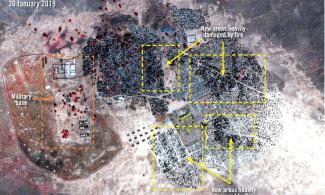
"This week’s attack on Rann was the deadliest yet by Boko Haram, killing at least 60 people."

Sixty people were killed in Monday's attack on Rann, Borno State, by Boko Haram, Amnesty international has said.
The agency said analysis from satellite images revealed the figure, just as it feared that camps for Internally Displaced Persons (IDPs) were also affected in the attacks.
In a statement released on Friday, the human rights organisation noted that the murdered persons were people who came to Rann to seek protection.
The statement read: “At least 60 people were killed following the 28 January devastating Boko Haram attack on Rann, a border town in Borno state, northeast Nigeria, Amnesty International has confirmed.
“The organization also analyzed satellite imagery which shows hundreds of burned structures in the town. Many of the destroyed structures only date back to 2017, suggesting they were shelters for internally displaced people who came to Rann seeking protection.”
Osai Ojigho, Director of Amnesty International Nigeria, noted that they had “confirmed that this week’s attack on Rann was the deadliest yet by Boko Haram, killing at least 60 people”.
“Using satellite imagery we have also been able to confirm the mass burning of structures as Boko Haram unleashed a massive assault on Rann, most of which is now destroyed. This attack on civilians who have already been displaced by the bloody conflict may amount to possible war crime, and those responsible must be brought to justice. Disturbingly, witnesses told us that Nigerian soldiers abandoned their posts the day before the attack, demonstrating the authorities’ utter failure to protect civilians,” she said.
The organisation alleged that troops withdrew, which “triggered a massive exodus of civilians to Cameroon, as fear spread that Boko Haram would take advantage and attack the town”.
The statement continued: “At around 9am on 28 January, a group of Boko Haram fighters arrived on motorcycles. They set houses ablaze and killed those left behind. They also chased after those who attempted to escape and killed some people outside the town. Eleven bodies were found within Rann town, and 49 bodies were found outside.
“Amnesty International was informed that about 50 people have not been accounted for. Those who took part in the burial explained what they saw.”
Narrating the incident, an eyewitness said: “Ten of us [Civilian Joint Task Force] came from Cameroon to Rann for the burial. When we arrived, we found and buried 11 corpses within the town, but the soldiers told us that they buried several others yesterday [30 January] who had decayed. Outside the town, we recovered and buried 49 dead bodies all with gunshot wounds.”
The United Nations had said 30,000 civilians fled for the border with Cameroon over the last few days. This is different from the 9,000 who had earlier fled Boko Haram’s previous attack on Rann on 14 January,
Amnesty International analysed satellite images from January 30, 2019, showing hundreds of structures burned in the east, south and southeast of Rann. The organisation also noted that environmental sensors detected fires in the area on January 28 and 29, 2019.
More than 100 structures were said to have been burnt in the January 14 attack, with other parts of the town “heavily damaged or destroyed”.
Amnesty International also called on Nigerian authorities to investigate the allegations that security operatives of the Multi-National Joint Task Force (MNJTF) from Rann withdrew from the area.
“Boko Haram has consistently and deliberately targeted civilians in Rann, which makes the Nigerian authorities failure to protect people all the more unacceptable. The authorities on both sides of the border must provide the supplies and safety that these people require. The Cameroonian authorities must also desist from forcing people to return until conditions are safe and they choose to do so voluntarily,” Ojigho added.